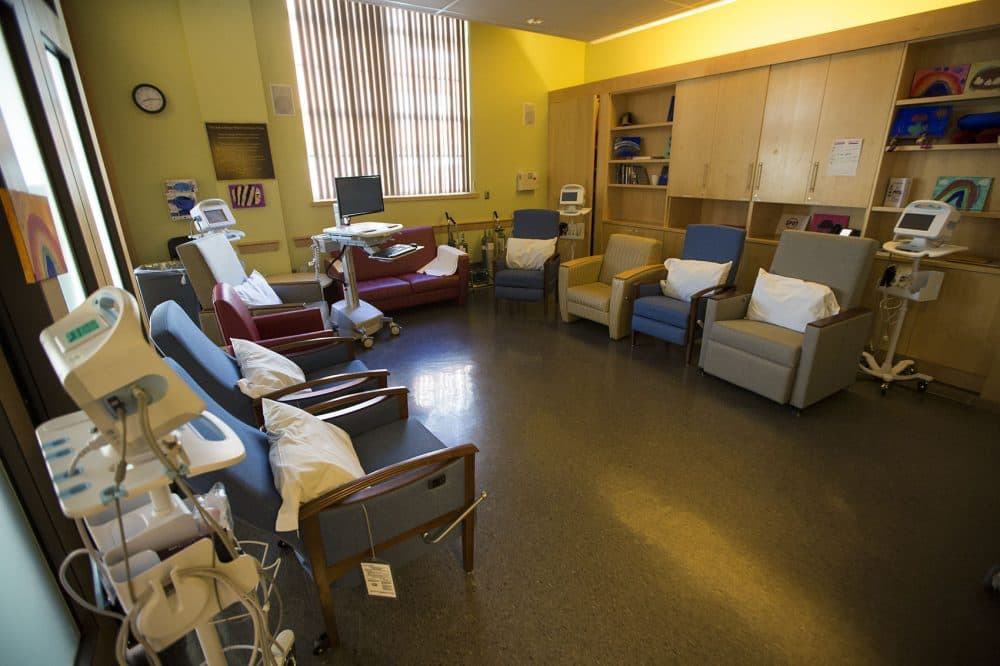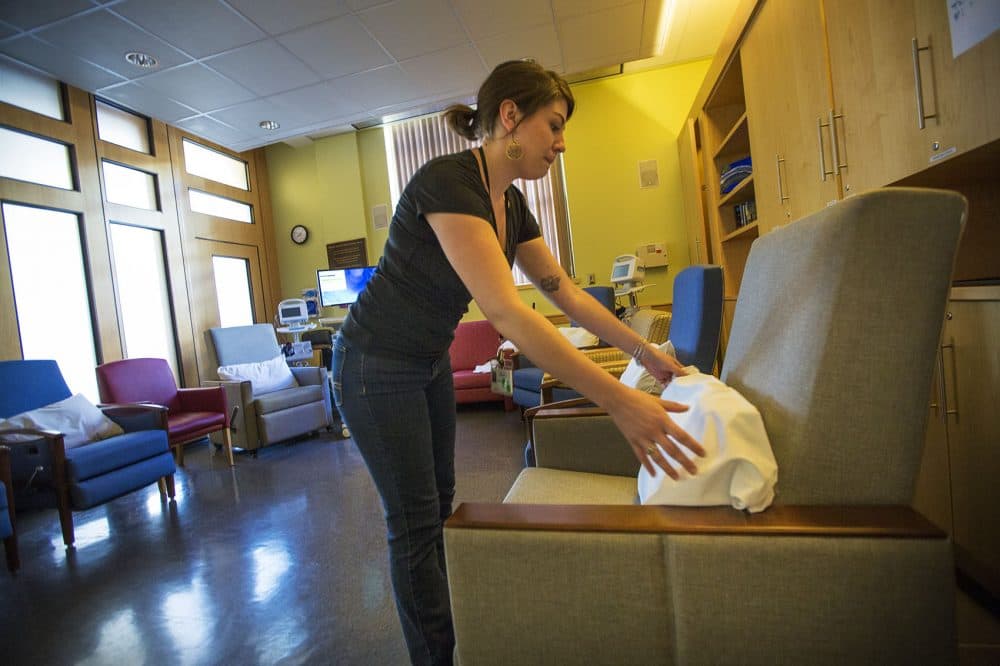Advertisement
Massachusetts Medical Society Trustees Ask Members To Support Safe Injection Facilities For Drug Users

At the end of April, physicians who set policy for the Massachusetts Medical Society (MMS) will vote on a recommendation that the group advocate for a supervised injection facility (SIF) pilot program in Massachusetts. The recommendation was approved by a unanimous vote of the board of trustees in February.
If approved, the Massachusetts Medical Society says it would become the first statewide physicians group to endorse the idea of a room where a doctor or nurse is on duty while drug users inject, swallow or smoke an illegal substance and ride out a high.
"It's about trying to get individuals into an environment, where they have a much better chance of surviving their substance use disorder, to a point in time where they actually are able to make progress in recovery," says Dr. Dennis Dimitri, immediate past president of MMS and chairman of the society’s task force on opioids.
There no such SIFs, also known as a supervised drug consumption facility, in the U.S., although Seattle and King County in Washington plan to open two. In Massachusetts, the medical society conducted a feasibility study. It found that patients who use SIFs in Vancouver and Australia are less likely to overdose and die and more likely to seek treatment than are drug users who do not use in supervised settings.
Medical Ethics And Legal Issues Around Safe Injection Sites
But is it ethical for a physician to be in a room where patients are doing something illegal and potentially dangerous?
Dimitri says yes, because doctors would be helping patients with a brain disease, substance use disorder.
"We felt that the ethics of doing this were justifiable, that putting a program such as this in place would do more benefit than any harm," Dimitri says.
Supporters of supervised injection facilities say attention from the medical society signals the idea is moving from the fringe into mainstream medicine. But many people find it hard to believe physicians would support such a program.
"To set up a place where addicted people would go and shoot up heroin to me sounds crazy," says Norwood Police Chief William Brooks.
Brooks is the immediate past president of the Massachusetts Chiefs of Police Association and sits on the board of the International Association of Chiefs of Police. Brooks says he knows the medical society's goal would be to save lives.
"And that’s a laudable goal, we share that," says Brooks. "But I just don’t think that that’s the direction we ought to be going in. It does feel like we’re giving up, we’re throwing our hands up, and I don’t think we should do that."
Dimitri says a SIF program would be a new tool for physicians and nurses, not an indication the medical community is throwing in the towel. He mentions a recent state report that estimates nearly 2,000 deaths last year.
Advertisement
"That number has gone up dramatically and shows no signs of abating any time soon," Dimitri says, "so given that, we think it's important that we use our bully pulpit to be leaders on this issue."
That means persuading a city or town in Massachusetts, perhaps two, to allow this illegal activity. It means persuading Gov. Charlie Baker to issue an executive order allowing the SIF pilot or lobbying the Legislature to exempt the program from state drug possession, consumption and conspiracy laws.
Leo Beletsky, an associate professor of law and health sciences at Northeastern University outlined the legal options for the medical society.
"It does take some measure of discretion to allow such experimentation to proceed, but it is possible," Beletsky says.
There is a bill on file at the State House that would allow safe injection facilities, but it hasn’t moved so far this session. The lead sponsor, state Sen. Will Brownsberger, a Democrat, says he's been surprised that colleagues are open to the idea. But he says there's a missing piece.
"We need an initial municipal partner here," says Brownsberger. "Right now, we have a bill at the state level, but we don't really have somebody who's asking for it who actually has the potential to implement it."
Dimitri says the medical society would likely favor Boston, if delegates vote to pursue the pilot, and expand on the work being done in Boston Health Care for the Homeless Program's Supportive Place for Observation and Treatment clinic. At SPOT, a nurse monitors patients while high, but they cannot use drugs in the room. Some neighbors are wary. They say the South End has more than its share of programs for the homeless and those addicted to drugs.

"While we continue to absolutely want to be aggressive in terms of addressing the issue of drug use, we also think we need to be balanced in our approach in terms of where these [SIFs] are located," says Steve Fox, head of the South End Forum. It's an umbrella group that includes the South End's 17 neighborhood associations as well as area business groups.
While it's too early to say if SPOT might be a pilot safe injection site, the clinic's medical director, Dr. Jessie Gaeta, says she's proud to see the medical society giving the idea serious consideration.
"And it couldn't come at a better time," says Gaeta. "We're continuing to have patients who are injecting heroin in public spaces and are hiding and are at such high risk of overdose. So I feel desperate that we're looking to see if it's possible to do this."
But even if the medical society chooses to mount a SIF campaign, and can convince state government to allow the pilot, doctors, nurses and patients could still face arrest under federal law. A safe injection facility would not seem to fit the drug war agenda Attorney General Jeff Sessions mentioned during remarks in March.
"Will they choose to use their enforcement discretion to go after a public health facility of this sort?" Beletsky says. "The answer to that is unknown."
Dimitri says there would be no point in pursuing a SIF pilot unless there's a state law exemption and some understanding with the federal government because doctors would not have liability protection if they practice in an illegal facility.
Twenty-three-year-old Nicholas Chiu is not deterred. Chiu, a second-year Boston University medical student, brought the idea of supervising drug users to the medical society more than a year ago. He says he's confident that skeptics will see the value of SIFs once they look at results from other countries.
"It’s important to recognize that sometimes you have to make a compromise for the greater good," Chiu says, adding, "you know, dead patients can’t be saved."
If a SIF pilot does go forward in Massachusetts, it would include nurses. The Massachusetts Nurses Association says it has not been approached about or considered the idea.
This segment aired on April 5, 2017.
